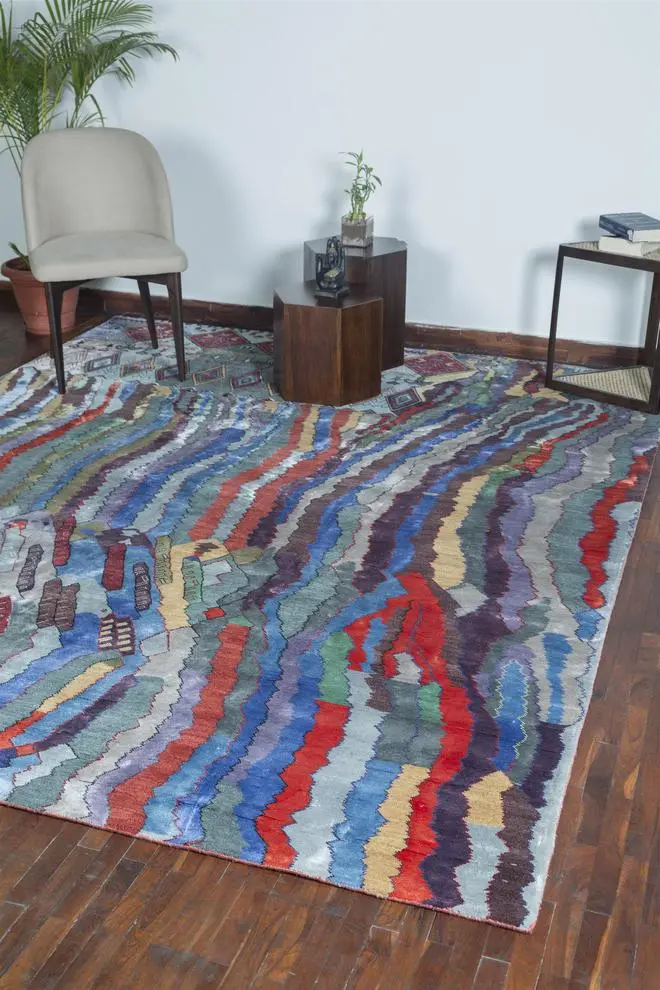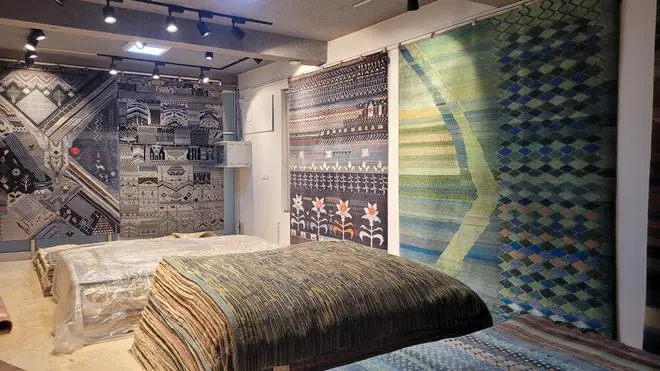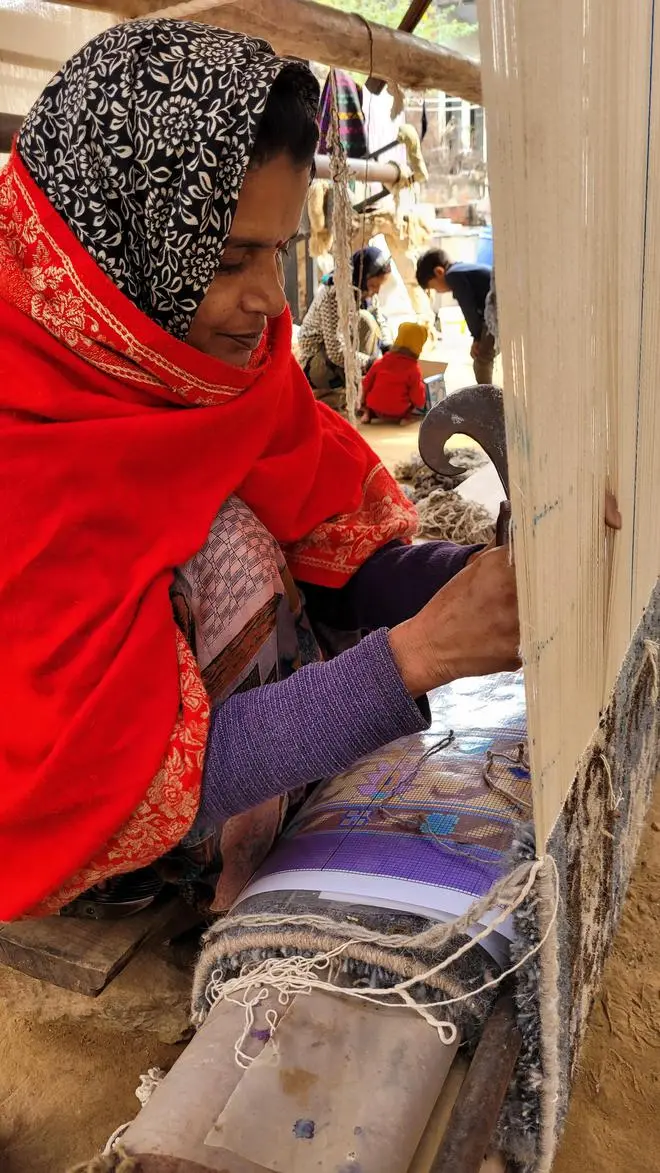Till 2016, Jaipur Rugs – the social impact carpet company from Pink City founded by NK Chaudhary back in 1978 as Bharat Carpet Enterprises – was only into exports, and more a B2B firm. It did create waves for empowering women weavers and building a strong artisan community through skilling and training.
But how this family-run company, which started with nine artisans on two looms, made its carpets fly in the domestic market and got into direct retail, is also an interesting case study in challenging conventions, emotional branding and creative storytelling.
Today, nearly 20 per cent of the ₹770 crore company’s business comes from India and almost 9 per cent is through retail sales. The magic formula was to take the creative dignity of the weaver and connect it to the customer.
As Yogesh Chaudhary, Director, Jaipur Rugs, and the son of NK Chaudhary, who looks after finance and marketing at the firm, explains, “In ancient days the weaver knew who he or she was making the carpet for and there used to be an emotional connection. We are trying to bring that back.”
While the Jaipur Rugs Founder NK Chaudhary, also called the Gandhi of the carpet industry, now looks after the foundation work, as well as production, all his five children are deeply involved in the business too. “I have three elder sisters and a younger brother. Two of my sisters and brother are in the US and run Jaipur Living, which sells our rugs there. The third sister Kavita looks after design at the company,” says Yogesh Chaudhary.
Weaving a connect

A Manchaha carpet
Till 2016, the thinking in the company was that a carpet retail business in India could not be profitable as it was a hot country, with a lot of dust and Indians were not really big carpet consumers. But a trip to Bangalore and looking at how carpets were sold, or rather mis-sold, convinced Chaudhary that a huge market existed here and also of the need for a direct retail connect – mainly to educate consumers on types of carpets and why some were priced in lakhs, while others in thousands.
The price of the hand-knotted carpets depends on the number of knots (196 knots per square inch is premium), the design, the fabric, which could be wool, wool and silk mix, wool and bamboo silk and so on.
The first store was set up in Delhi with some radical concepts. “We offered free cleaning in the first two years, no questions asked returns, and a two-year warranty for the carpet. In the store we had a loom and a weaver and started to educate the customer on the intricacies of a hand-knotted carpet,” says Chaudhary.
At the same time, the website was set up and e-commerce also started. “Online has become a great platform to help customers discover variety and has become very important to our retail sales,” says Chaudhary.
Well-timed
Timing of the domestic market entry was perfect as the Indian consumer — even those in the south — had started buying carpets and rugs to liven up home decor. And distribution channels were changing too – most home furnishing stores usually stocking bedsheets and pillows started stocking carpets and rugs too.

Another move by Jaipur Rugs to spur sales was to start a Rug Utsav mega sale just before Diwali. “Till then the home decor industry blindly followed the fashion industry cycle of sales before summer and winter. We decided to break this,” says Chaudhary, explaining how the Utsav also gave an opportunity to consumers who had been saving up for an expensive carpet to get it at an affordable price.
Today, there are eight retail stores, including one in Milan, plus three franchise run stores in China and one in Russia. And a really impressive experience centre at Narain Niwas Palace in Jaipur where imagination has been given free rein on how the carpet can be used in a home – as a frame of a mirror, as a wall or ceiling tapestry, as the base from which lights hang and more .
Artisans’ stories
Here also are displayed the pride of the Jaipur Rugs collection – the Manchaha (Heart felt) range. Although a lot of top designers and celebrities (including Gauri Khan) work with Jaipur Rugs, it’s the artisan-created range that has captured customer imagination hugely.
In 2012, the company had allowed its artisan community to come up with their own designs calling them ‘The Artisans’ Original’. It flopped. Then Yogesh’s sister Kavita overheard the weavers talking about their “man chaha” work. “The name came from the artisans themselves. And we discovered that each carpet they designed had a story to it, mainly inspired by their own surroundings. We took those stories to the customers and the range became a huge hit,” says Chaudhary.

For instance, three women have together woven a carpet called Bachchpan ki Baarish – a very nostalgic memory of their friendship with white drops reflecting the rains and the clouds.
The consumer-artisan connect is happening in a big way, says Chaudhary, describing how many consumers — especially those who commission special design carpets — interact with the artisans and form a bond.
Earlier reluctant, now many of the women weavers are excited to do Manchaha. At Manpura Machedi, we see a young quartet Gayatri, Suman, Santosh and Rinku excitedly working together on a Manchaha. They say they have been knotting it for 2 and half months now, and should have it ready in a month.
The Manchaha range was extended into the jails of Rajasthan where Jaipur Rugs had trained and skilled inmates. These were called ‘Freedom Manchaha Collection’ and again flew.
Covid times accelerated the home furnishing and accessories business. The company had in any case been constantly growing at a CAGR of 15 to 20 per cent. Chaudhary says they will look to close this year at ₹900 crore. With over 40,000 artisans spread across 600 villages working on 7,000 looms, the knots and connections are growing stronger.







Comments
Comments have to be in English, and in full sentences. They cannot be abusive or personal. Please abide by our community guidelines for posting your comments.
We have migrated to a new commenting platform. If you are already a registered user of TheHindu Businessline and logged in, you may continue to engage with our articles. If you do not have an account please register and login to post comments. Users can access their older comments by logging into their accounts on Vuukle.